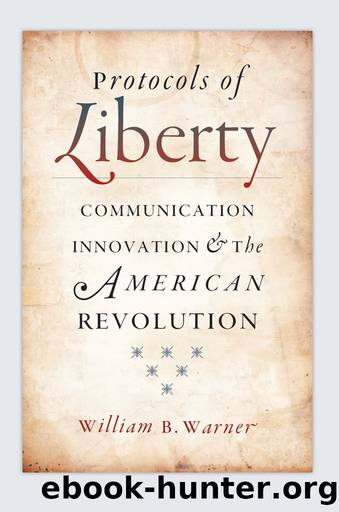Protocols of Liberty by William B. Warner

Author:William B. Warner [Warner, William B.]
Language: eng
Format: epub
Tags: History, General, United States, Revolutionary Period (1775-1800), Literary Criticism, American, Political Science, History & Theory
ISBN: 9780226061405
Google: VWJJAAAAQBAJ
Publisher: University of Chicago Press
Published: 2013-09-20T04:11:13+00:00
FIGURE 4.1. Boston Committee of Correspondence broadside of the resolves of the House of Burgesses instituting the Virginia Committee of Correspondence are here embedded in a letter âfrom a Gentleman of distinction in Virginiaâ (almost certainly Richard Henry Lee) âto his Friend in this Townâ (Thomas Cushing Jr.), which is then embedded in a printed letter to the committees of correspondence (or the selectmen) of the various towns (here Westminster) of Massachusetts, signed by the clerk of the Boston committee, William Cooper. Photograph courtesy of the American Antiquarian Society.
By April 9, 1774, Richard Henry Lee had written twice to Boston, once by private letter to Samuel Adams, and once in a semi-official letter to Thomas Cushing, enclosing the resolves of the Virginia Committee of Correspondence. Aware of the arrival of Leeâs private letter to Adams, the Boston committee requested that its chairman, Samuel Adams, draft an official reply to Lee. I will quote from the April 10, 1774, letter at some length because it not only contains an extensive and systematic statement of the revolutionary imperative to network; it also performs the networking it describes. The letter uses six distinct threads to secure a strong bond between Adams and Lee, Massachusetts and Virginia.
Building a framework for trusted communication through expressions of esteem: âI had frequently heard of your Character and Merit, as a warm Advocate for Virtue and Libertyâ (S. Adams 1904, 3:25). The Boston Committee of Correspondence, which held a âspecial meetingâ on your resolves, âdesiredâ me âto assure you of their veneration for your most ancient colony, and their unfeigned esteem for the gentlemen of your committeeâ (27). The epithet âancientâ grants Virginia its pride of place as the first successful English colony in America.
Urging the practice of general communication among the colonies: âI have often thought it a misfortune, or rather a fault in the friends of American independence and freedom, their not taking care to open every channel of communication. The colonies are all embarked in the same [ship] bottom. The liberties of all are alike invaded by the same haughty power: the conspirators against their common rights have indeed exerted their brutal force, or applied their insidious arts, differently in the several colonies, as they thought would best serve their purpose of oppression and tyranny. How necessary then is it; that All should be early acquainted with the particular circumstances of Each, in order that the wisdom & strength of the whole may be employed upon every proper occasion.â Only communication that is timely, particular, and extends to âallâ the colonies will enable each colony to face the âbrutal forceâ or the âinsidious artsâ of Britainâs âhaughty power.â
Noting that in facing British power separately, the record of the colonies has been uneven: Adams wishes that âthe little colonyâ of Rhode Island âhad shown more firmnessâ in the face of the Gaspée commission; the âcompliance of New Yorkâ in providing âannual provision for a military forceâ; the âtimidity of some colonies and the silence of other colonies is discouraging.
Download
This site does not store any files on its server. We only index and link to content provided by other sites. Please contact the content providers to delete copyright contents if any and email us, we'll remove relevant links or contents immediately.
The Power of Myth by Joseph Campbell & Bill Moyers(1046)
Half Moon Bay by Jonathan Kellerman & Jesse Kellerman(977)
Inseparable by Emma Donoghue(971)
A Social History of the Media by Peter Burke & Peter Burke(966)
The Nets of Modernism: Henry James, Virginia Woolf, James Joyce, and Sigmund Freud by Maud Ellmann(888)
The Spike by Mark Humphries;(804)
The Complete Correspondence 1928-1940 by Theodor W. Adorno & Walter Benjamin(772)
A Theory of Narrative Drawing by Simon Grennan(771)
Culture by Terry Eagleton(768)
Ideology by Eagleton Terry;(729)
World Philology by(710)
Farnsworth's Classical English Rhetoric by Ward Farnsworth(705)
Bodies from the Library 3 by Tony Medawar(700)
Game of Thrones and Philosophy by William Irwin(699)
High Albania by M. Edith Durham(695)
Adam Smith by Jonathan Conlin(684)
A Reader’s Companion to J. D. Salinger’s The Catcher in the Rye by Peter Beidler(674)
Comic Genius: Portraits of Funny People by(642)
Monkey King by Wu Cheng'en(640)
